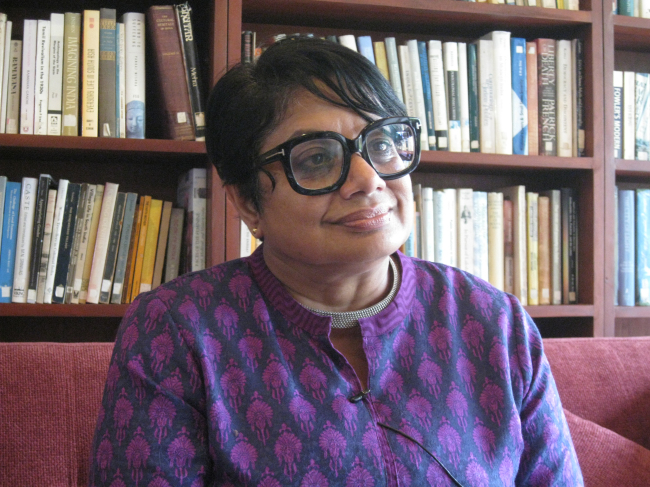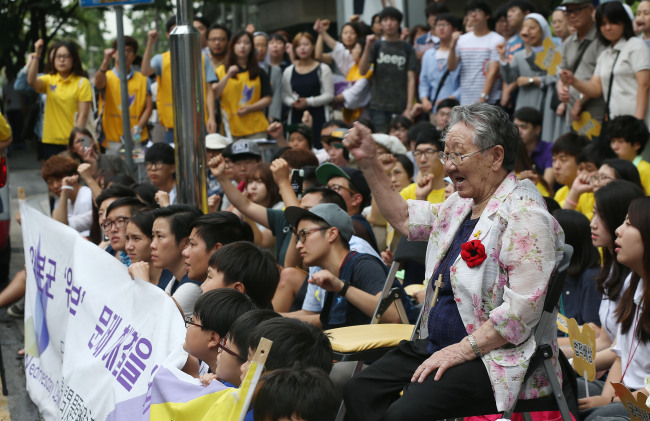COLOMBO ― A former top U.N. expert on women’s rights urged Japan to come up with a resolution to a decades-long dispute over its wartime sex slavery, criticizing Tokyo for moving “backwards” with its historic revisionism.
Radhika Coomaraswamy, the U.N. special rapporteur on violence against women from 1994-2003, warned that the issue of the so-called comfort women would “come back to bite” Japan if it continues attempting to whitewash its imperial past and undermine earlier apologies.
“Recently, it seems to have gone back to a very hard-line position that was there before 1995,” she said in an interview with Korean reporters in the Sri Lankan capital.
One example was Japan’s recent review of its landmark 1993 apology for its mobilization of Korean and other Asian women in frontline brothels during World War II, which concluded that it was not possible to confirm that the women were forcibly recruited.
The conclusion backs Tokyo’s long-held claim that the victims cannot be categorized as slaves and the feud was settled by a 1965 agreement that normalized its relations with Seoul.
“We don’t understand why the government of Japan is at the forefront elsewhere but would not just sit down with its representatives and the representatives of the ‘comfort women’ and just work out a final settlement. It’s just very simple,” she added.

Radhika Coomaraswamy, former U.N. special rapporteur on violence against women (Joint Press Corps)
A lawyer and academic from Sri Lanka, Coomaraswamy has been a leading voice for women and children, especially those affected by armed conflict. She also served as the U.N. undersecretary-general and special representative for children and armed conflict from 2006-12 and currently teaches at New York University’s school of law.
Her comprehensive 1996 report set a milestone in the Japanese sex slavery issue, reckoning that the Japanese government has both legal and moral obligations toward the women forced to provide sex for its military during the three-year war.

Kil Won-ok (right), an 86-year-old victim of Japan’s sex slavery during World War II, and other activists stage a rally calling for an apology and compensation from Tokyo outside the Japanese Embassy in Seoul on Wednesday. (Yonhap)
The document cast new light on not only the comfort women but also overall wartime violence against women, which she called an “invisible issue” in the international community.
“It was not brought up in Tokyo, for example. That was one of the big problems. … And it hadn’t been brought up in Nuremberg either,” Coomaraswamy said, referring to the trials of Japanese and Nazi war criminals after World War II.
“So we thought that it would be a way, 50 years after the end of World War II, to bring this issue up, to first give it visibility and secondly make it an occasion on which the Japanese government could then do something.”
The international community has recently heaped pressure on the Shinzo Abe administration to change course and atone for the country’s wartime atrocities.
Early this month, U.N. high commissioner for human rights Navi Pillay issued a statement expressing regret over Tokyo’s failure to come up with a “comprehensive, impartial and lasting resolution” of the sex slavery issue. The human rights breaches against the victims “continue to occur as long as their rights to justice and reparation are not realized,” she said.
The U.N. Human Rights Committee in July also urged “immediate and effective legislative and administrative measures” to ensure that all allegations regarding women’s enslavement are probed and perpetrators prosecuted.
With the issue being the biggest hurdle for a thaw between its two main regional allies, Washington officials have met with former “comfort women” while U.S. President Barack Obama lambasted the mobilization of sex slaves as a “terrible, egregious and shocking” violation of human rights.
The rising calls reflect the “frustration” of the international community, Coomaraswamy said, adding that she herself is “perplexed” because Japan has been traditionally supportive in every other issue of human rights.
“It is very clear from the evidence that this was a coercive set of practices. … Why not accept and do the right thing? Why is it not being done?” she said.
“Unilaterally they can do it by having an apology and by paying compensation, or they can do it after meeting the representative of the comfort women and working an arrangement out. Either way, they’re not dealing with the problem.”
By Shin Hyon-hee, Joint Press Corps
(heeshin@heraldcorp.com)







